Sensitive skin is the most common issue with the underlying causes. Sensitive skin care is also caused by increasing external stimuli, leading to symptoms such as redness, itching, burning, swelling, and skin irritation. It hurts the person’s life, causing discomfort and low self-esteem. It is also essential for understanding its symptoms and effectively managing it. If the home remedies do not relieve you, consult a healthcare professional for the best treatment.
Skin Redness Dysfunction:
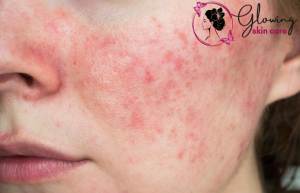
The skin consists of many layers epidermis is the outermost layer of the skin; it acts as a protective layer. It consists of fats and proteins, etc. they protect the moisture loss and also protect it from irritation and allergens. In sensitive skin, it also compromises the barrier, allowing the irritants more easily. They also lead to inflammation and trigger symptoms.
Nerve Sensitivity:
The sensory Nerve in the skin is the most populated; it detects various situations like touch, temperature, and pain. In sensitive skin, heightened sensitivity nerves are more reactive also leading to sensations such as itching, burning, and stinging.
Inflammation:
The immune system responds when the skin irritants overreact, also leading to inflammation. In chronic inflammation and further illness, the skin barrier shows symptoms.
Underlying Health Conditions:
- The dry skin weakens its tissue which causes burning and irritation.
- The Rosacea chronic facial condition is caused by redness, flushing, and visible blood vessels.
- Atopic Dermatitis skin conditions are caused by itching and inflamed skin.
Common Causes Of Sensitive Skin:
There are many causes of symptoms in people with sensitive skin. The following symptoms are:
Skincare Products:
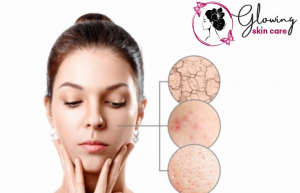
- In Fragrances, the artificial smell is caused by common irritants.
- Parabens, phthalates, and formaldehyde are chemicals even avoided because they can irritate sensitive skin.
- Harsh detergents are sodium lauryl sulfate and sodium laureth sulfate, the skin’s natural oils.
- High alcohol content can also dry out the skin and increase irritation.
Environmental Factors:
- Weather changes such as extreme temperatures, humidity, and winds can also damage the skin cells.
- The sun’s exposure to UV radiation also damages the skin and causes inflammation.
- Air pollution also contributes to the premature aging skin and can cause redness, irritating the skin.
Lifestyle Factors:
- Smoking also damages the skin, which can increase skin sensitivity.
- Stress can also cause inflammation and intensify skin symptoms.
- Some foods such as spicy food, fast food, alcohol, etc are also create skin reactions in some different ways.
Dry Skin:
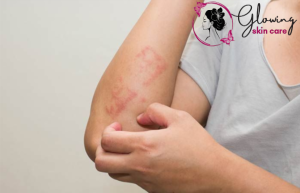
When the skin loses too much water and excessive oil it means the skin becomes dry. Some causes of your dry skin.
- Itching.
- Scale or flake.
- Peel.
- Feeling rough to the touch.
- Bleeding, and cracking.
- Redness or ashy-looking.
- Dry skin also appears on all parts of the body but it’s also common on the hands, feet, arms, lower legs, etc.
Eczema:
Eczema also affects your skin, which can protect from irritants such as germs and chemicals etc in your detergents. Extra sensitive products do not bother some people such as soaps, cosmetics, etc. Some common symptoms of eczema vary from person to person. For example, Dryness, Itching, swelling of the skin, red or brownish-gray patches on the skin, scaly skin, and small bumps.
Mastocytosis Of The Skin:
Cutaneous mastocytosis is a common condition in which mast cells collected in the skin are part of the immune system. They also release some chemicals that cause swelling. Such as;
- Red spots on the body parts.
- Spots on the arms, legs, neck, stomach, etc.
- Some spots are flat.
- Some symptoms do not appear; they also increase by irritating the substance.
Photodermatosis:
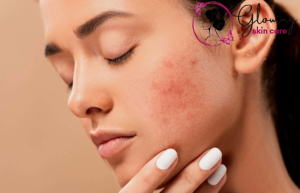
It is an abnormal skin reaction to the sunlight. UV rays come from the sunlight, which can increase the immune system issue, causing the rash, blisters, or scaly patches on the skin. Photodermatoses are the hardest to recognize.
- Some parts of the skin covered by hair are unaffected.
- These conditions are increasing more in the spring and summer seasons.
- Rashes appear on different parts of the body due to harmful sunlight.
- Most of the parts of skin that are covered by shadows, like eyelids and under the chin, are also spared.
Physical Urticaria:
Physical urticaria is caused by heat, cold, chemicals, plants, or exercise. Its symptoms include small hives, itching, swelling, and hives around the red ring of the skin, hives are found white, pink, or redness in the center.
Contact Urticaria (hives):
These hives are caused by the direct contact with the irritating substance. Symptoms include: welts, itching, and burning. Tingling, redness, swelling, etc.
Skincare Routine for Sensitive Skin:
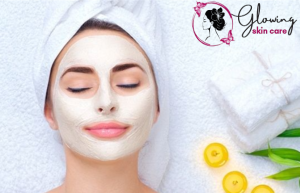
- Always use mild,fragrance-free cleansers that help to manage the pH of the skin.
- Also, Manage stress levels by practicing yoga, medical treatments, some exercises, etc.
- Regularly moisturize your skin with non-comedogenic moisturizers.
- Look at those product ingredients, such as ceramides, hyaluronic acid, glycerin etc.
- Avoid harsh treatments such as exfoliants, scrubs, and some other treatments that irritate the skin.
- Keep protecting your skin from the sun by using sunscreen with an SPF of 30 for daily use.
- Drink plenty of water to keep your skin moisturized, hydrated, and healthy from within.
- Should also eat a healthy diet such as fruits, vegetables, proteins, vitamins, whole grains, etc.
- Always use lukewarm water for showers.
- Also, pat your skin dry with a soft towel and avoid rubbing the skin.
- Must use the humidifier during the dry winter months.
Medical Treatments:
- In some cases of prescription moisturizers, doctors recommend the strength of the skin barrier.
- Oral antihistamines also help to relieve itching.
- Topical Corticosteroids may also be prescribed to reduce the inflammation.
Remedies For Sensitive Skin:
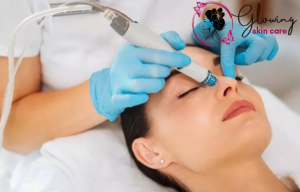
- Tea Tree Oil.
- Aloe Vera.Honey.
- Oatmeal Baths.
- Coconut Oil.
Characteristics of The Products For Sensitive Skin:
- Use those products that are free of harsh chemicals.
- Hypoallergenic substances are the common causes of allergic reactions.
- Use a moisturizer that has hydrating ingredients.
- pH also maintains the skin’s natural hydration.
- Non-comedogenic ones won’t clog the pores.
Most Popular Sensitive Skin Products:
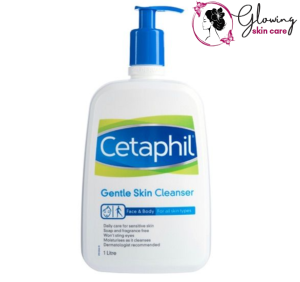
Cleansers:
Cetaphil Cleanser:
Cetaphil cleanser is the best skin care product for sensitive skin, and it is famous for its non-irritating formula.
Features:
- It is gentle, soap-free, and fragrance-free, which helps to minimize the risk of irritation.
- It contains glycerin for hydration that helps to retain moisture.
- These products are suitable especially for sensitive skin.
How To Use It:
- Use twice a day, morning and evening.
- Keep avoiding harsh scrubs as they hydrate the skin.
- If you notice any irritation, stop using and discuss it with a dermatologist.
- Wet the face with lukewarm water.
- Now, apply a small amount of cleanser on your hands.
- Gently massage your face and neck in a circular motion.
- Then rinse through with the fresh water.
Best Face Wash For Sensitive Skin:
- Cetaphil Gentle Skin Cleanser
- La Roche-Posay Toleriane Hydrating Gentle Cleans
- Aveeno Calm + Restore Nourishing Oat Cleanser
- Vanicream Gentle Facial Cleanser
- Fresh Soy Face Cleanse
- CeraVe Hydrating Facial Cleanse
- First Aid Beauty Pure Skin Face Cleanser
Dove Soap:
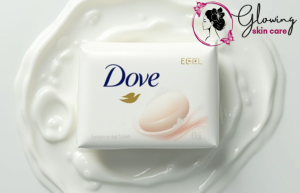
Dove soap for Sensitive Skin is the most famous product for sensitive skin. The Dove Sensitive Skin Beauty Bar is intended to give people with sensitive skin a mild and hydrating cleansing experience. The Dove Sensitive Skin Body Wash strives to give people with sensitive skin a pleasant and efficient cleansing experience by emphasizing gentle cleansing and moisturizing.
Features:
- It contains a mild cleanser that helps to prevent the chance of irritating sensitive skin.
- The fragrance-free soap also reduces the risk of allergic reactions.
- Enriched with ¼ moisturizing cream to help maintain the skin’s natural moisture barrier.
How To Use:
- Wet your face with warm water.
- Apply soap suds on the face,
- Then rise from the skin with water.
- Also, dry your face with a clean or soft towel.
- Use this Dove sensitive skin soap as a regular cleansing routine.
- Use the moisturizer for sensitive skin after taking a shower to hydrate your skin.
- If you experience any irritation, discontinue use and consult a dermatologist.
Sunscreen For Oily, Sensitive Skin:
Always choose the best sunscreen for sensitive skin, which contains those ingredients that prevent skin.
Mineral SunScreen:
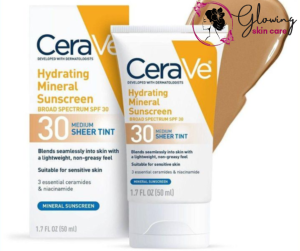
Mineral sunscreen for sensitive skin has titanium dioxide or zinc oxide for the blockage of rays. It contains ingredients that are less irritating to sensitive skin.
Fragrance-Free Sunscreen:
Fragrance is the most common irritant substance for people who have sensitive skin. Always look at the sunscreen that is labeled fragrance-free
Avoided Sunscreen:
Oxybenzone and Avobenzone are chemicals in sunscreen that can also irritate the skin. Therefore, this type of sunscreen must be avoided, especially by people with sensitive skin.
Test the sunscreen before using:
It also helps to determine if you notice any reactions to the sunscreen.
Sunscreen Recommended For Sensitive Skin:
- La Roche-Posay Anthelios Clean Skin Dry Touch Sunscreen SPF 60: This sunscreen is oil-free, fragrance-free, and non-comedogenic.
- EltaMD UV Clear Facial Sunscreen SPF 46: This mineral sunscreen is oil-free, fragrance-free, and has other ingredients. It is a good option for acne-prone skin.
- CeraVe Hydrating Sunscreen SPF30: This sunscreen is fragrance-free or non-comedogenic. Hyaluronic acid in it hydrates the skin.
Tips:
- Apply sunscreen on your face, neck, ears, and the tops of your hands.
- Reapply the sunscreen after two hours or more.
- Also, wear protective clothes like a wide-brimmed hat and sunglasses.
Best Toner For 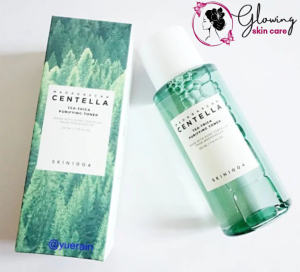 :
:
- CeraVe Hydrating Toner.
- Thayer’s Facial Toner.
- La Roche-Posay Serozinc Spray Toner:
- Paula’s Choice Toner.
- COSRX Toner.
Scrub For The Sensitive Skin:
- Yogurt Scrub.
- Oatmeal Scrub.
- Sugar Scrub.
- Jojoba Bead Scrub.
Best Foundation For Sensitive Skin:
- Neutrogena Hydro Boost Hydrating Tint
- Physicians Formula The Healthy Foundation
- Burt’s Bees Goodness Glows Liquid Foundation
- Tarte Babassu Foundcealer™ Skincare Foundation
- BareMinerals Original Loose Powder Foundation
Best Serum For Sensitive Skin:
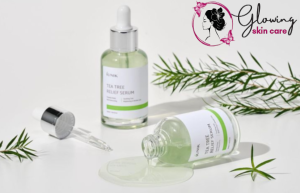
- Vitamin C serum.
- Niacinamide Serum.
- Ceramide Serum.
- Hyaluronic Acid Serum.
Veet Hair Removal Cream For Sensitive Skin:
The goal of Veet hair removal creams for sensitive skin is to make the process of hair removal less painful.
Features:
- Gentle Formula
- Fast-Acting
- Smooth Results
- Dermatologically Tested
How to Use:
- Cover the desired area with a thick, uniform layer.
- After doing a patch test, leave it on for five to ten minutes.
- Use the spatula to remove, then give it a good rinse.
Veet Wax Strips For Sensitive Skin:
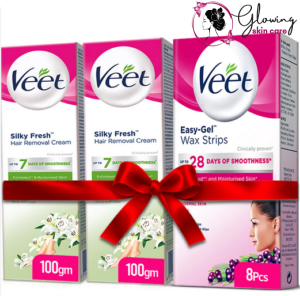
Hair can be easily removed from the root with Veet Wax Strips, which provide smoothness for up to 28 days. With its unique formulation, the Sensitive Skin version effectively removes hair while being gentle.
Features:
- Works on Short Hair
- Easy to Use
- Infused with Aloe Vera & Vitamin E
- Cold Wax Technology
- Long-Lasting Results
How to Use:
- For a few seconds, rub the strip between your hands to warm it up.
- The strips should be separated and then applied to the desired area, smoothing in the direction of hair growth.
- Quickly pull the strip off in the opposite direction of the hair’s growth.
- To get rid of any wax buildup and calm the skin, use the post-wax wipes that come with the package.
Precautions:
- Test the patch 24 hours before use.
- Don’t apply to sunburned, broken, or irritated skin.
- Avoid applying to the face.
- While redness is normal, it should go away in a few hours.
When to see a doctor:
- Persistent or worsening symptoms.
- Severe reactions.
Gentle Facial For Sensitive Skin:
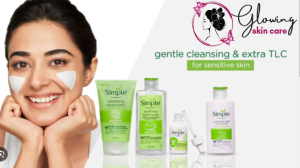
Simple Gentle Cleansing Kits is the best facial kit for sensitive skin and is an international facial brand. The facial kit for sensitive skin consists of a face wash, a face toner, face moisture, and serum.
Cleanser:
This cleanser has a rinse-free formula with vitamin B5&E, which helps to remove dirt and oil particles from the skin. It’s also fragrance-free and hypoallergenic.
Face Wash Gel:
Simple Cleanser face wash with vitamins that help refresh the skin without irritation.
Serum:
The face serum for sensitive skin is suitable with hyaluronic acid providing hydration without irritation.
Toner:
- This toner is designed for sensitive skin. It contains formula ingredients that help to calm and refresh the skin smooth. It is also alcohol-free and artificial perfumes-free and dyed.
- This product can also be used as a daily skincare routine.
Conclusion:
Skincare for Sensitive skin can be challenging, but with proper care and management, it is possible to minimize symptoms and improve your quality of life. Understanding the underlying causes, identifying and avoiding triggers, and adopting a gentle skincare routine are key to managing sensitive skin effectively. If you are struggling with sensitive skin, consult a dermatologist for personalized advice and treatment options.
FAQs:
What is sensitive skin?
Sensitive skin is a serious type of skin that is easily irritated. Some products also irritate, such as skin care products, environmental factors, and some more.
What type of sunscreen is best for sensitive skin?
- EltaMD UV Clear Facial Sunscreen SPF 46.
- Hydrate Lotion Sunscreen SPF 50.
- La Roche-Posay Anthelios Clear Skin Dry Touch Sunscreen Fluid SPF 60
Which soap is best for sensitive skin?
Dove soap is best for sensitive skin.
Is CeraVE good for sensitive skin?
Yes, CerVe products are the best option for sensitive skin.
How to treat sensitive skin on the face?
- Cleansing.
- Hydration.
- Sunscreen
- Avoid Irritants Limit Exfoliation.
When should we see a dermatologist?
If you notice any symptoms are severe, persistent, or not improving must meet with a dermatologist.

